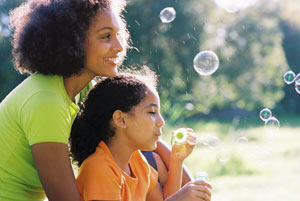All of us went in to being a parent with the best intentions. We fantasized about bedtime stories and snuggles, family meals, engaging conversation, and more. It’s likely we underestimated the influence that sleep deprivation, constantly cleaning up after others, temper tantrums, and increased financial demands would have on our ability to stay positive. In an effort to reconnect with our good intentions, I offer the following ideas from the Positive Parenting Program (Triple P), an evidence-based parenting program created in Australia now offered at Parents Place.
Triple P describes Positive Parenting as “an approach to being a parent that aims to promote children’s development and manage children’s behavior and emotions in a constructive and non-hurtful way. It is based on strong, nurturing relationships, good communication and positive attention to help children develop.” It reminds us that we are our children’s teachers. Rather than getting frustrated that they don’t know things that may appear obvious to us, we can teach them how to stay safe and behave well in playful and engaging ways.
Suggestions include:
Creating a safe, interesting environment. Triple P reminds parents that children require adequate supervision and a child-proofed environment so parents can feel more relaxed and confident their children can play and explore without getting hurt.
- Fewer dangerous or fragile opportunities in a home mean less need for a parent to say “no” repeatedly, resulting in fewer injuries and power struggles.
- Children do best in a play environment that invites them to explore, experiment, get messy, and hone their skills. Offering your child a stimulating environment will help them develop their language and motor skills, as well as foster their intellectual development.
- If children have interesting things to do, they are less likely to become bored or misbehave. This doesn’t mean you need to buy your child more things. Rotate toys through the house, reintroduce them a month or two after they’ve been stored away, recycle household objects for art projects, and explore nature. “Interesting” need not be expensive.
Having a positive learning environment. Children need parents to be available and engaged. While adults obviously need to attend to their own lives, it is important that children feel seen and heard. Triple P suggests:
- Short, frequent amounts of quality time (without phone interruptions, screens, etc.) can help children feel valued. When possible, stop what you are doing and listen when your children approach you with something they want to share.
- Help your children master new skills by encouraging them to try to do things for themselves. Support them by offering step-by-step instructions, physically guiding them through a task (e.g., teeth brushing), or offering support when they ask for help. While it may seem easier or faster to do things for your children, they need opportunities to practice to build a sense of mastery and independence.
- Model a positive tone of voice to convey respect and teach them how to speak to others.
- Share your own experiences. Children need to be taught the give-and-take of a conversation. Share a highlight of your day or a story from childhood that they may enjoy.
- Use descriptive praise. When you see your children engaging in positive behavior, describe it so they know exactly what pleased you, e.g. “Thank you for waiting patiently while I finished my conversation.” What we notice most is what we’ll see more of. Praise is best when it is sincere and clear.
Stay tuned for “The Power of Positive Parenting: Part II,” which will include suggestions on using assertive discipline and having realistic expectations for both your children and yourselves.



